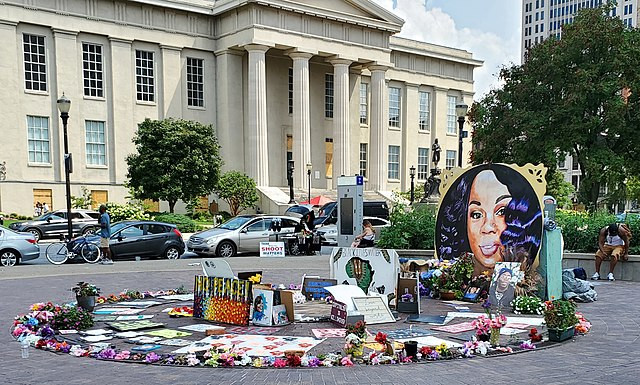A federal judge has dismissed major felony charges against two former Louisville police officers implicated in the death of Breonna Taylor, a case that has drawn national attention and sparked widespread protests. The decision has reignited debates over accountability in law enforcement, particularly in cases involving the deaths of Black individuals.
U.S. District Judge Charles Simpson III ruled that Taylor's death was legally caused by the actions of her boyfriend, Kenneth Walker, who fired a shot at police officers during a late-night raid on March 13, 2020. The officers were executing a search warrant at Taylor's apartment in connection with a drug investigation, but the warrant was later found to be based on falsified information. Despite this, the judge concluded that Walker's decision to shoot was the direct cause of Taylor's death, not the flawed warrant that led the officers to her door.
"The Court finds that the warrantless entry was not the actual cause of Taylor's death," Simpson wrote in his ruling. "The Court also concludes that the Death-Results charge requires proof of proximate cause and that allegations in this case show that the warrantless entry was not the proximate cause of Taylor's death. Even if it were, K.W.'s decision to open fire is the legal cause of her death, it being a superseding cause."
The ruling effectively reduces the most severe charges against former Louisville Police Detective Joshua Jaynes and former Sergeant Kyle Meany, who had been accused of civil rights violations that could have resulted in life sentences. Both Jaynes and Meany were not present during the raid but were charged with falsifying the information that led to the issuance of the search warrant. The judge's decision downgrades the charges against them to misdemeanors, sparking outrage among Taylor's family and civil rights advocates.
The case has been a focal point in the broader movement against police brutality, especially after it gained renewed attention following the murder of George Floyd in May 2020. Taylor, a 26-year-old Black woman, was killed in the hallway of her apartment after officers returned fire in response to Walker's gunshot. Walker, who claimed he believed an intruder was breaking into the apartment, was initially charged with attempted murder of a police officer, though those charges were later dropped.
Attorney General Merrick Garland had previously emphasized the importance of the charges against Jaynes and Meany, stating that they were necessary to uphold the civil rights of Americans. "Breonna Taylor should be alive today," Garland said at the time of the indictments. However, Judge Simpson's ruling has cast doubt on the likelihood of severe consequences for the officers involved.
The judge did, however, allow conspiracy charges against Jaynes and another charge against Meany to stand, ensuring that both former officers will still face legal consequences for their actions related to the falsification of the search warrant. Jaynes and another former officer, Kelly Goodlett, allegedly conspired to mislead investigators and cover up the warrant's deficiencies. Goodlett has already pleaded guilty to a conspiracy charge and is expected to testify against her former colleagues in their upcoming trials.
The legal team representing Breonna Taylor's family expressed deep disappointment with the ruling. In a statement, the family said, "We are devastated at the moment by the judge's ruling with which we disagree and are just trying to process everything. We will continue to fight until we get full justice for Breonna."
Federal prosecutors have indicated that they plan to appeal Simpson's ruling, and the Department of Justice is currently reviewing the decision to determine its next steps. The case continues to be closely watched, as it has significant implications for how the justice system handles cases of alleged police misconduct.
Meanwhile, the legal battles surrounding the case are far from over. Brett Hankison, another former officer involved in the raid, faces retrial on charges of endangering Taylor, Walker, and their neighbors through excessive use of force. Hankison's initial trial ended in a mistrial earlier this year, and federal prosecutors are preparing to retry him in October.




